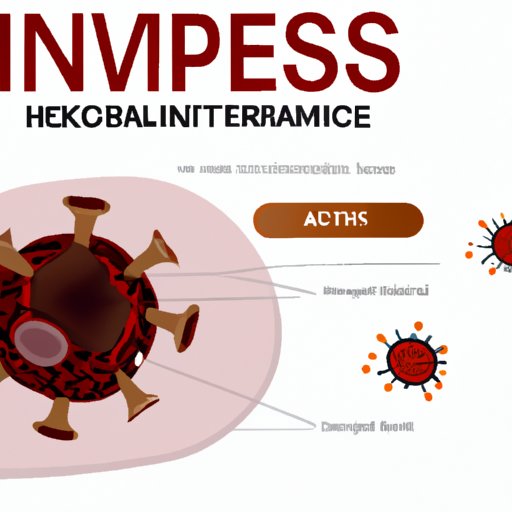
Introduction
Herpes is a common viral infection that affects millions of people worldwide, while autoimmune diseases are a group of disorders that affect the immune system’s ability to recognize and defend the body against invaders. There has been much debate among researchers about whether herpes can trigger autoimmune responses and contribute to the development of autoimmune disorders. In this article, we will explore the link between herpes and autoimmune diseases and try to understand how the virus and the immune system interact.
The Link Between Herpes and Autoimmune Diseases: What You Need to Know
Herpes is a viral infection caused by the herpes simplex virus (HSV). There are two types of herpes: HSV-1, which usually causes cold sores on the mouth, and HSV-2, which is typically responsible for genital herpes. Autoimmune diseases, on the other hand, are a group of chronic conditions in which the immune system attacks healthy cells and tissues, causing inflammation and damage.
Some researchers believe that herpes may trigger autoimmune responses by causing the immune system to attack healthy cells as if they were foreign invaders. Herpes viruses are known to have a complex relationship with the immune system, often evading or manipulating it to survive and replicate within the body. These properties may contribute to the development of autoimmune disorders, as the immune system becomes confused and attacks the body’s own tissues.
Herpes and Autoimmunity: Understanding How the Virus and the Immune System Interact
To understand how herpes may contribute to the development of autoimmune disorders, it is important to know how the immune system responds to the virus. When a person is infected with herpes, the immune system sends white blood cells to attack the virus. However, herpes has several tricks up its sleeve to evade detection by the immune system. For instance, it can lie dormant in nerve cells for years, escaping the immune response.
Similarly, herpes may manipulate the immune system by inducing the production of cytokines, which are inflammatory molecules that can cause tissue damage. The immune system may also overcompensate for a herpes infection by producing too many antibodies and white blood cells, which may then attack healthy cells and tissues, leading to autoimmune responses.
Does Herpes Affect the Immune System? The Answer Might Surprise You
Contrary to what some people believe, herpes doesn’t weaken the immune system. In fact, herpes may actually activate and over-stimulate the immune system, potentially leading to autoimmune responses. This is because herpes viruses have evolved to coexist with the immune system and manipulate it to their advantage. However, this delicate balance can be disrupted, leading to autoimmune disorders in some cases.
Exploring the Possible Connection Between Herpes and the Development of Autoimmune Disorders
Several autoimmune diseases have been associated with herpes infections, including lupus and multiple sclerosis. However, establishing a definitive causal link between herpes and autoimmune disorders is challenging. Many other factors, such as genetics and environmental triggers, play a role in the development of autoimmune diseases. Herpes infections may simply be one of several risk factors that contribute to autoimmune responses.
Herpes and Autoimmune Diseases: The Search for a Strong Correlation
Current research on the link between herpes and autoimmune diseases is conflicting, with some studies finding a strong correlation and others finding no association at all. Scientists are still trying to pinpoint the mechanisms by which herpes may trigger autoimmune responses. Some promising areas of research include looking at the role of specific immune cells and investigating the effects of antiviral medications on autoimmune diseases. More research is needed to better understand the complex relationship between herpes and autoimmune disorders.
Herpes and Its Effect on the Immune System: Could It Lead to Autoimmune Disease?
The relationship between herpes and autoimmune diseases is complex and potentially bidirectional. While some studies have suggested a link between herpes and disorders such as lupus and multiple sclerosis, more research is needed to establish a causal relationship. If you have concerns about herpes or autoimmune diseases, it’s important to talk to your healthcare provider about your symptoms and risk factors.
It’s also essential to take care of your overall health by eating a healthy diet, getting enough sleep, and avoiding behaviors that can weaken your immune system, such as smoking and excessive alcohol consumption. Staying informed and educated about the latest research on herpes and autoimmune diseases can also help you make informed decisions about your health.
Conclusion
Herpes and autoimmune diseases are complex and multifaceted conditions that continue to generate much research and debate. While some evidence exists to suggest that herpes may contribute to the development of autoimmune disorders, more research is needed to establish a solid causal link. It’s critical for individuals to talk to their healthcare providers about their symptoms and risk factors and to take steps to maintain their overall health and well-being. Continued research on herpes and autoimmune diseases is essential to developing better treatments and prevention strategies.





